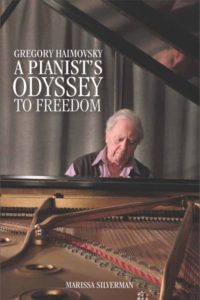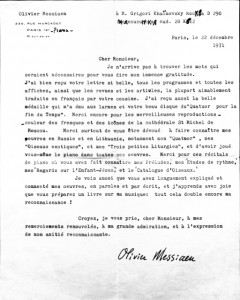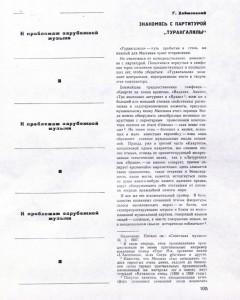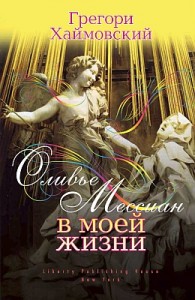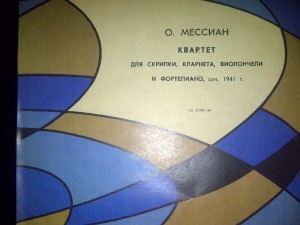The previously untold story of the brilliant Russian concert pianist Gregory Haimovsky is revealed in Marissa Silverman’s new book for University of Rochester Press.
Exiled by the Soviet regime, Haimovsky found a way to perform the “banned” Western music of Olivier Messiaen and fight the USSR’s cultural prohibitions.
Letter from Olivier Messiaen, Paris, December 22, 1971
“Dear Sir,
I can not find words that could express my gratitude to you. I received your wonderful letter, all the programs and posters, as well as reviews and articles, most kindly translated into French by your cousin. I also received a beautiful medal, which thrilled me to tears, and your remarkable record “Quartet for the end of time.” Thank you also for the wonderful color reproductions of the frescoes and icons from the Mikhailovski Cathedral in Moscow. A special thank you that you are loyal to the cause of making known my works in Russia and Lithuania, as it is with my Quartet, Exotic birds and Three little liturgies, and for the fact that you are playing the piano in these works. Thank you for the piano recitals where you acquainted the public with my Preludes, Etudes de rhythm, Regards on Jesus the Child and the Catalogue of Birds. I also see that for a long time you have been explaining and commenting orally and in writing my works, and I learned with joy that you have prepared a book about my music, this is still double my gratitude! Once more, with gratitude, great admiration and expression of my grateful friendship.” — Olivier Messiaen
INTRODUCED TO RUSSIA the music of one of the greatest French composers of the 20th century, OLIVIER MESSIAEN. HAIMOVSKY PREMIERED Messiaen’s music in MOSCOW and across the USSR. He WROTE the FIRST RUSSIAN BOOK about Messiaen’s CREATIVITY and PHILOSOPHY. And PUBLISHED the FIRST MUSICOLOGICAL EXAMINATIONS of Olivier Messiaen’s music for RUSSIAN PRESS.
[jwplayer mediaid=”1643″]
There were no experts on Messiaen’s music during the 1960s in Russia and the Soviet Union. No one could help Haimovsky learn about Messiaen’s idiosyncratic compositional techniques. He only had Messiaen’s repertoire as a source and guide. Thus, Haimovsky played everything Messiaen composed.
Some time later, performing Messiaen’s music for the public, he realized that this music, especially when first encountered, catches the listener off guard due to its unusual sonic characteristics. After all, people in the Soviet Union were not prepared for Messiaen’s compositional inspiration: no one had composed music about the constants of sound-light and space-time, nor were the following subjects accepted by Russian and Soviet composers: God, faith, space, nature, and Oriental spirituality… Although God and faith were developed in Western and Russian music. Nature, too, was decorum of human life, and so Nature found her way into the music of Russian composers in particular… But not the images of the cosmos, nor Oriental spirituality, nor any ancient sphinxlike talk of nothingness and, most importantly, no one had composed music that focused specifically on “Time” as a personified image, like that of an actor speaking—time, speaking from the first-person perspective… None of this existed in the musical culture of our country.
In 1964, Haimovsky performed the Quartet. He learned there was nothing yet written about it in Russia. Only through French sources did Haimovsky learn that Messiaen’s fate brought him to the front of Second World War. Then Messiaen was taken prisoner by the Germans and was in a concentration camp in Silesia at Gorlitz. One can imagine the towers with guards, dogs, barbed wire, as well as gun machines directed at prisoners. Death hung over all the prisoners—the French, Belgians, Dutch … And there, Messiaen wrote his String Quartet. There, as Haimovsky writes in his manuscript, in the heart of the misery and horror, Messiaen composed the first movement of the Quartet, “Morning liturgy of birds.” Haimovsky asks: “What kind of person should someone be to commit this feat! In his music, Messiaen spoke neither of the suffering or misfortune, nor of depression, nor the humiliation of humanity. Instead, he wrote about the morning’s liturgy of birds…”
By some miracle, someone from the camp informed the guards that they have in their custody a major composer. Thus, he was given manuscript paper and a pencil. The compositional instrumentation of the Quartet was determined by what musicians were in the camp with Messiaen.
Messiaen’s Quartet is equally far from realism and romanticism. He seems to be above all such aesthetics. Instead of belonging to a specific epoch or era, we experience a high soaring spirit. And the music of Messiaen, performed outdoors in the freezing cold for thousands of prisoners, is not charged by any ideology; only by the power of faith in God, praised in hope for all.
And on March 6, 1968, in the Small Hall of Moscow Conservatory, this Quartet was heard. It was Gregory Haimovsky’s discovery of Messiaen’s music for our listeners and thanks go to him.
[Radio announcer: “You are listening to the program “From the History of concert discoveries: Olivier Messiaen in Russia. The host of the program is singer and musicologist, Sergei Yakovenko]
Then, there was one extremely important premiere of Messiaen’s music in Russia. And with this premiere it was clear that this composer was one of the greatest titans of the 20th century. It was Haimovsky’s performance of Turangalila-Symphony on May 8, 1971 in the Great Hall of the Moscow Conservatory by the USSR State Symphony Orchestra under Yevgeny Svetlanov.
I was told by Gregory Haimovsky and Yevgeny Svetlanov that the orchestra initially reacted quite skeptically towards this music, given the unfamiliar style of it. At the rehearsal, Yevgeny Fedorovich asked Haimovsky to talk briefly about the Symphony, and in general about this new (for the musicians of the orchestra) style.
But actually, do you know who they are, these musicians of the major orchestra in our country? Professors, distinguished artists… They are a pretty sarcastic group. With a smile, although on the whole very friendly, they listened to everything, but Haimovsky in his speech did not dispel their doubts that they were going to portray cosmic love and a rushing into eternity’s time, as reflected in Sanskrit word-combination “Turanga-lila.” Still, the musicians were amused by Haimovsky’s story about the music…
But then Svetlanov intervened; he waved his baton and all of the words lost their significance for in the Great Hall of the Conservatory entered magnificent music that was larger than life.
The evening was a triumph for Messiaen. I was at that concert. Afterwards, quite a fury swept all backstage. It was impossible to get to Svetlanov. By the way, Svetlanov—as a man was a good person, always benevolent to his friends and classmates (he studied with Haimovsky at the Gnesin School)—never went to take any bows without Gregory Haimovsky. He hugged Haimovsky on stage, kissed and thanked him, and brought attention to the fact that it is thanks to Gregory Haimovsky, that Messiaen entered our lives.
Mostly musicians were in the concert hall and they all rushed backstage. I remember how the enthusiastic Kirill Kondrashin literally tore towards Svetlanov through the crowd. He wanted to thank him and congratulate him for introducing him and others to the music of Messiaen.
I think about Messiaen together with Haimovsky: From where came his belief and an interest in all the other children of the earth? The Japanese, with their ancient Gagaku? The Latin Americans with their ancient songs of love and death in Harawi? The American Indians with their endless echoing canyons? Messiaen, the Frenchman, went beyond his soil. He stood above the stories of his day. Messiaen was a Christian in every sense of the word. All of his life he served the images of Jesus and Mary, and, ideally, the highest humanity. His birds sing Hosanna to God and give comfort to those suffering in their faith. He never looked about in search of his faith, and never changed it. He never praised anyone but God. As a musician and philosopher, Messiaen rose to unprecedented heights in the 20th century. These are the ideas that permeate Haimovsky’s books. And this is what he speaks about while performing the music of the great Olivier Messiaen.
PREMIERES and SCHOLARSHIP
With his own hands, literally and figuratively, Gregory Haimovsky brought the music of Olivier Messiaen to Russia. Below are the dates of his concert premieres and publications.
1964
May 5, Glinka State Conservatory of Music, Gorky, USSR. Chamber Music of the 20th Century. Georges Auric, Andre Jolivet, Olivier Messiaen, and Andre Dutilleaux. Works by Olivier Messiaen:
“Le Baiser de l’Enfant-Jesus” from Vingt regards sur l’enfant-Jésus
Rondo
Gregory Haimovsky, piano
Harawi
2. Bonjour toi, colombe verte
9. L’escalier redit, gestes du soleil
7. Adieu
Nina Cherednikova, soprano and Gregory Haimovsky, piano.
Visions de l’Amen, 2 movements
Isaac Katz and Gregory Haimovsky, piano
November 3, Glinka State Conservatory of Music, Gorky, USSR. Music of the 20th Century. Concert on French Composers: Jean-Yves Daniel-Lesur, Darius Milhaud, Olivier Messiaen. Introductory words by Gregory Haimovsky. Works by Olivier Messiaen:
Themes and Variations for Violin and Piano
Georgi Vassiliev, violin, Gregory Haimovsky, piano.
First performance in the USSR.
1965
“On Creativity and Theory of Messiaen.” Soviet Music, 10, pp. 119-123.
1966
December 22, Monograph Concert, Olivier Messiaen. Concert Hall of Composer’s Union. Moscow, USSR.
Visions de l’Amen
1. Amen de la Creation
2. Amen des Etoiles, de la Planete a l ‘Anneau
3. Amen de l’Agonia de Jesus
4. Amen du Desir
5. Amen des Anges, des Saints, du Chants des oiseaux
Isaac Katz and Gregory Haimovsky, piano
Harawi
1. La ville qui dormais, toi
2. Bonjour toi, colombe verte
9. L’escalier redit, gestes du soleil
7. Adieu
Nina Cherednikova, soprano and Gregory Haimovsky, piano.
Quatour pour la Fin du Temps
1. Liturgie de crystal
2. Vocalise, pour L’ange qui annonce la fin du Temps
3. Abime des oiseaux
4. Intermedè
5. Louange a l’èternitè de Jesus
6. Danse de la fureur, pour les sept trompettes
7. Foullis d’arcs-en-ciel, pour l’ange qui annonce la fin du Temps
8. Louange à l’immortalite de Jesus.
Mark Baranov, violin; Viktor Simon, cello; Vladimir Tupikin, clarinet; and Gregory Haimovsky, piano.
1967
January, “Getting to Know the Score of Turangalîla-Symphonie.” Soviet Music. 1, pp. 104-113.
March, “Getting to Know the Score of Turangalîla-Symphonie.” Soviet Music. 3, pp. 105-113.
April 27, 1st Philharmony Monograph Concert, Olivier Messiaen. Concert Hall of the Nizhny Novgorod Philharmonic, Nizhni Novgorod, USSR.
Visions de l’Amen
1. Amen de la Creation
2. Amen des Etoiles, de la Planete a l ‘Anneau
3. Amen de l’Agonia de Jesus
4. Amen du Desir
5. Amen des Anges, des Saints, du Chants des oiseaux
Isaac Katz and Gregory Haimovsky, piano
Harawi
1. La ville qui dormais, toi
2. Bonjour toi, colombe verte
9. L’escalier redit, gestes du soleil
7. Adieu
Nina Cherednikova, soprano and Gregory Haimovsky, piano.
Quatour pour la Fin du Temps
1. Liturgie de crystal
2. Vocalise, pour L’ange qui annonce la fin du Temps
3. Abime des oiseaux
4. Intermedè
5. Louange a l’èternitè de Jesus
6. Danse de la fureur, pour les sept trompettes
7. Foullis d’arcs-en-ciel, pour l’ange qui annonce la fin du Temps
8. Louange à l’immortalite de Jesus.
Mark Baranov, violin; Viktor Simon, cello; Vladimir Tupikin, clarinet; and Gregory Haimovsky, piano.
1968
January 12, Lithuanian Official Premiere. Lithuania State Philharmony Society. Vilnius, Lithuania.
Francis Poulenc, Darius Milhaud, and Olivier Messiaen. Works by Olivier Messiaen:
Quatour pour la Fin du Temps
1. Liturgie de crystal
2. Vocalise, pour L’ange qui annonce la fin du Temps
3. Abime des oiseaux
4. Intermedè
5. Louange a l’èternitè de Jesus
6. Danse de la fureur, pour les sept trompettes
7. Foullis d’arcs-en-ciel, pour l’ange qui annonce la fin du Temps
8. Louange à l’immortalite de Jesus.
Mark Baranov, violin; Viktor Simon, cello; Vladimir Tupikin, clarinet; and Gregory Haimovsky, piano.
February 11, Official Premiere. State Philharmony, Malyi Hall, Tchaikovsky Conservatory of Music, Moscow, USSR.
Quatour pour la Fin du Temps
1. Liturgie de crystal
2. Vocalise, pour L’ange qui annonce la fin du Temps
3. Abime des oiseaux
4. Intermedè
5. Louange a l’èternitè de Jesus
6. Danse de la fureur, pour les sept trompettes
7. Foullis d’arcs-en-ciel, pour l’ange qui annonce la fin du Temps
8. Louange à l’immortalite de Jesus.
Mark Baranov, violin; Viktor Simon, cello; Vladimir Tupikin, clarinet; and Gregory Haimovsky, piano.
May 19, Moscow State Philharmony. The Hall of the House of Scientists.
Quatour pour la Fin du Temps
1. Liturgie de crystal
2. Vocalise, pour L’ange qui annonce la fin du Temps
3. Abime des oiseaux
4. Intermedè
5. Louange a l’èternitè de Jesus
6. Danse de la fureur, pour les sept trompettes
7. Foullis d’arcs-en-ciel, pour l’ange qui annonce la fin du Temps
8. Louange à l’immortalite de Jesus.
Mark Baranov, violin; Viktor Simon, cello; Vladimir Tupikin, clarinet; and Gregory Haimovsky, piano.
August 4, Solo piano recital, Mikalojus Konstantinas Čiurlionis Memorial Museum. Druskininkai, Lithuania. Mikalojus Konstantinas Čiurlionis, Claude Debussy, Maurice Ravel, and Olivier Messiaen. Works by Olivier Messiaen:
Huit preludes
- La colombe
- Le nombre léger
- Les sons impalpables du rêve
Gregory Haimovsky, piano
October 1, Contracted by Soviet Composer to write Olivier Messiaen.
November 25, Concert Hall of Composer’s Union. Moscow, USSR.
Oiseaux Exotiques (Premiere performance in the USSR)
Chamber ensemble All-Union Radio and Television. Gennady Rozhdestvensky, conductor; Gregory Haimovsky, piano.
Le Merle Noir for flute and piano (Premiere performance in the USSR)
Alexander Koreev, flute; Gregory Haimovsky, piano
Isle de feux, No. 1 (Premiere performance in the USSR)
“Le Baiser de l’Enfant-Jesus” from Vingt regards sur l’enfant-Jésus
Gregory Haimovsky, piano
1970
January, Turned in the manuscript of Olivier Messiaen to Soviet Composer.
February 1, Moscow State Philharmony Concert Hall Gnesin Institute. Moscow, USSR
Quatour pour la Fin du Temps
1. Liturgie de crystal
2. Vocalise, pour L’ange qui annonce la fin du Temps
3. Abime des oiseaux
4. Intermedè
5. Louange a l’èternitè de Jesus
6. Danse de la fureur, pour les sept trompettes
7. Foullis d’arcs-en-ciel, pour l’ange qui annonce la fin du Temps
8. Louange à l’immortalite de Jesus.
Mark Baranov, violin; Viktor Simon, cello; Vladimir Tupikin, clarinet; and Gregory Haimovsky, piano.
November, LP Recording Release. 1st recording in the USSR Quatour pour la Fin du Temps.
Mark Baranov, violin; Viktor Simon, cello; Vladimir Tupikin, clarinet; and Gregory Haimovsky, piano.
December 7. Club of Chamber Music of Composer’s Union
“L’Alouette Lulu” from Catalogue d’Oiseaux (Premiere performance in the USSR)
Gregory Haimovsky, piano
1971
April, 12. 600 Concerts of Chamber Orchestra. Vilnius, Lithuania.
Trois petites liturgies de la Présence Divine
- Antienne de la conversation interieure
- Séquence du Verbe, cantique divine
- Psalmodie de l’ubiquité par amour
Chamber Orchestra of Lithuania; Philharmonic Choir of the School of Arts; Saulius Sondeckis, conductor; Gregory Haimovsky, piano.
May 8, Official Premiere Moscow State Philharmonic. Bolshoi Hall of the Tchaikovsky Conservatory of Music. Arts Festival “Moscow Stars.”
Turangalîla-Symphonie
I. Introduction
III. Turangalîla I
IV. Chant d ‘Amour
VII. Turangalîla II
VI. Jardin du sommeil d’Amour
IX. Turangalîla III
V. Joie du sang des etoiles
USSR State Symphony Orchestra. Evgeny Svetlanov, conductor; Gregory Haimovsky, piano.
September 10, Official Premiere. Lithuania State Philharmony Society. Third All-Union Chamber Music Festival. Vilnius, Lithuania.
Trois petites liturgies de la Présence Divine
- Antienne de la conversation interieure
- Séquence du Verbe, cantique divine
- Psalmodie de l’ubiquité par amour
Chamber Orchestra of Lithuania; Philharmonic Choir of the School of Arts; Saulius Sondeckis, conductor; Gregory Haimovsky piano.
September 11, Lithuania State Philharmony Society. Third All-Union Chamber Music Festival. Kaunas, Lithuania.
Trois petites liturgies de la Présence Divine
- Antienne de la conversation interieure
- Séquence du Verbe, cantique divine
- Psalmodie de l’ubiquité par amour
Chamber Orchestra of Lithuania; Philharmonic Choir of the School of Arts; Saulius Sondeckis, conductor; Gregory Haimovsky, piano.
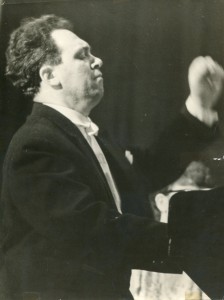
The photo is a gift to Haimovsky from photographer Semen Henkin in memory of the Soviet premiere of “Exotic Birds” in the Concert Hall of Composer’s Society USSR (Moscow). November 12, 1968, under Gennady Rojdestvensky
Excerpts from reviews:
“Grishinka [Haimovsky’s nickname] is a genius. When we were students at the Gnesin School, no one spoke about us (Genya Rozhdestvensky and I). All the credits were given to him. Elena Fabianovna adored him … And how he played Messiaen with me and the State Orchestra the first time in Russia at the Great Hall of [Moscow] Conservatory! As a matter of fact, he discovered for me and for the musicians of the orchestra, as well as for all Russian listeners, this composer.”[i]
[i] Svetlanov quoted in “You are the supreme court for yourself” Sergei Yakovenko, p. 28-37. Quote from p. 37. Musical Academy, No 1, 2003.
“He penetrated Messiaen’s breathtaking world of sound and color, evoking wonderful shivering cries in l’Alouette Lulu, an extract from Messiaen’s Catalogue of Birds.” — Bernard Holland, The New York Times
“Messiaen’s Le Baiser de l’Enfant-Jesus, a rarely performed work, further demonstrated Haimovsky’s rare ability as a sensitive colorist. His playing throughout was ethereal, presenting an evanescent glimpse of another world.” — George A. Sinclair, NAPA Register, USA
“The virtuosic command of the instrument, the lightening-like qualities of his playing, and the constructive depths of his thoughts were especially clearly displayed in L’Alouette Lulu by Olivier Messiaen, where the interpreter used the contrasts of bird calls and trills with the peals of the monotonic falling chords. A similar impression was left by Le Baiser de l’Enfant-Jesus (from Vingt Regards de Infant Jesus), infused with what seemed at first glance to be hazy mysticism.” — Jari Israchi, Maariv, Tel Aviv, Israel
“Messiaen’s Le Baiser de l’Enfant-Jesus was a tightly-controlled, sensitive rendition which exploited the piece’s dynamic breadth with loving care.” — Daniel Ziff, The Jerusalem Post, Israel
“The program ended with three pieces by Olivier Messiaen which were not much short of being awesome. Haimovsky performed some gymnastics of his own at the keyboard, and the effect of the blue-white music coupled with a dazzling virtuosic display brought the audience to its feet.” — Jonathan Bruce Brown, The Saginaw News, Michigan, USA
L’ Alouette Lulu from Catalogue-d’Oiseaux
“Ile de feu I” from Etude De Rythme
“Le Baiser de l’Enfant-Jésus” from Vingt regards sur l’Enfant-Jésus
“At times it is difficult or even impossible to establish who introduced to our country the work of one or another foreign master. In the case of Messiaen, we have this opportunity. From the source of such a phenomenon like ‘Messiaen in Russia’ stood one man. Namely, Gregory Haimovsky” (Vladimir Nestyev, “Olivier Messiaen: Serving humanity,” Musical Life, September, 2009).
“Till now and for many people, the premiere in the Great Hall of the Conservatory of the grandiose Symphony for piano with orchestra Turangalila was a memorable day. The conductor was Evgeny Svetlanov, pianist-soloist Gregory Haimovsky.” (Sergey Jakovenko, “The encounter with on old friend,” Musical Life, January, 1996).
“Although there was a large crowd of musicians that filled the hall…Overwhelming number of audience members were first time acquainted with the music of this French composer… Turangalila had indeed stunning success, special source of which I would define with these words: ‘delight of discovery’ …The impression was as if the audience suddenly detected totally unknown planet… The arduous score demanded colossal work from State Symphony Orchestra of USSR, its chef-conductor Evgeny Svetlanov and pianist-soloist Gregory Haimovsky.” (Gennady Shokhman, 1971. “Remarkable event,” Soviet music, No. 8).
“In 1967, Haimovsky published in Soviet music (Nos. 1 and 3) the articles ‘Getting to know the score of Turangalila-Symphony,’ which founded the beginning of our native musicology on Messiaen. Two years after he also presented to the publishing house the book Olivier Messiaen: About creativity, life, views… In the city of Gorky … thanks to the efforts of pianist G. Haimovsky, the first monographic concert of Messiaen’s music took place. There, the following works were premiered: Vision de l’Amen, Quatuor pour la fin to temps, vocal cycle Harawi. (At the concert hall of philharmony, April 27, 1967). Messiaen’s discography in our country also started with the Quatuor, which was recorded by Melodya by Gregory Haimovsky with his friends-performers in 1970.” (Victor Yekimovsky. The presentation for conference dedicated to 100th anniversary of Messiaen’s birth, Tchaikovsky Conservatory in Moscow. 2008).
“Getting to know the score of Turangalila-Symphony” by Gregory Haimovsky (1967, Soviet Music) above is a fragment of the 20-page article, which cemented the presence of Olivier Messiaen’s music on the Russian musicological horizon.
Gregory Haimovsky. Olivier Messiaen in my life. Liberty publishing house. New York. 2009. Review by Anatoly Liberman. Mosty, No. 28, 2010. Frankfurt, Germany.
I will not tell you how Haimovsky worked step by step to achieve the comprehension of Messiaen’s creativity (the chapters of the book are called “The Music,” “On Aesthetics,” “From the beginning to the Light of beyond,” and also there are reprinted in the annexes his articles from Soviet Music for 1965 and 1967). This can be read in his autobiography, In the Search of the Island of Joy also published by Liberty…this book is written in the spirit of the poem of ecstasy: there, it explains what Messiaen means for its author. His book is about how he discovered Messiaen’s musical world and how the major part of his life was marked by meetings with it…Haimovsky’s multi-dimensional portrait of Messiaen shows us the composer not as a hermit, not as a mystic or messiah, but an “absolutely modern man” of encyclopedic culture…Haimovsky writes: “I was and I still remain the irredeemable debtor of this most incredible, superior of all I ever had known in my long life. I was and I still remain captive and wanderer in his immense sound-and-color galaxy” (p. 188). Haimovsky had the rare good luck in his life, but not every composer so lucky, like Messiaen, to find such an unselfish interpreter and friend.
First recording of Messiaen’s Quartet in Russia — 1969. Melodia. Mark Baranov, violin; Vladimir Tupikin, clarinet; Viktor Simon, cello; Gregory Haimovsky, piano.
Crystal liturgy
Vocalise for the Angel who announces the end of time
Abyss of birds
Interlude
Praise to the eternity of Jesus
Dance of fury
Tangle of rainbows, for the Angel who announces the end of time
Praise to the immortality of Jesus
©
